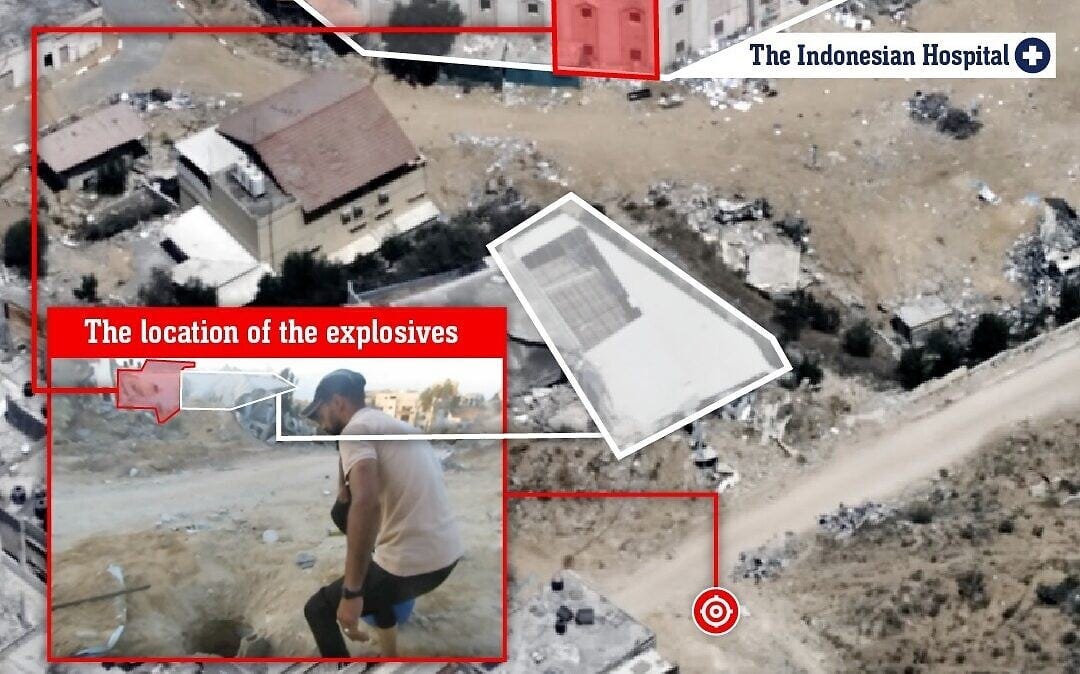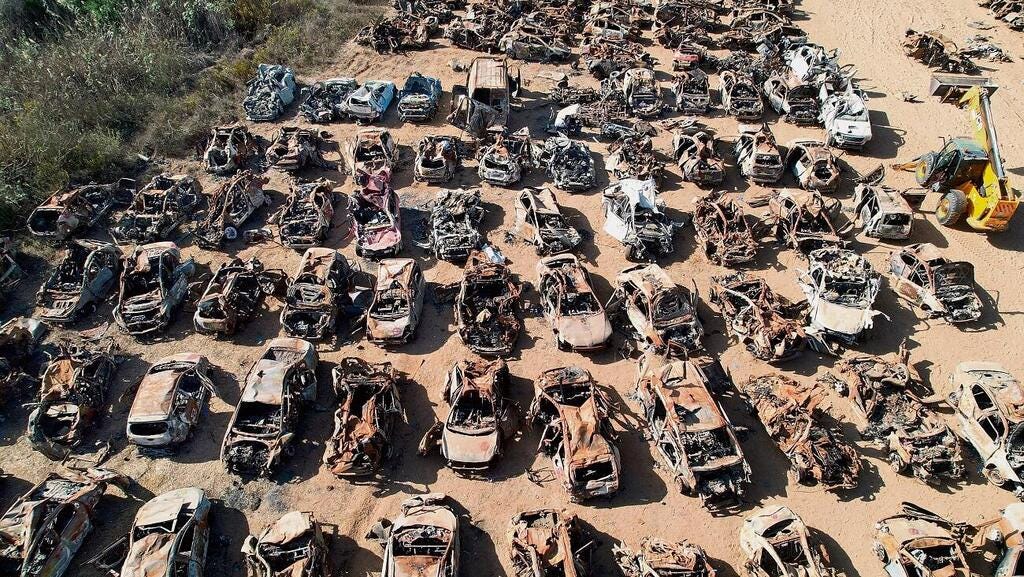The Palestinians got what they asked for.
If martyrdom is glorified, then Israel's retaliation should, by the Palestinians' own standards, be considered a favor.
Please consider supporting our mission to help everyone better understand and become smarter about the Jewish world. A gift of any amount helps keep our platform free of advertising and accessible to all.
You can also listen to the podcast version of this essay on Apple Podcasts, YouTube Music, YouTube, and Spotify.
October 7th will be remembered as a day of catastrophic miscalculation by Palestinians, primarily but not exclusively in Gaza.
The orchestrators of the surprise assault on Israeli civilians imagined themselves as the masterminds of chaos, unleashing terror with a brazenness rarely seen.
What they did not anticipate — or perhaps willfully ignored — was the tidal wave of retaliation that would follow. In their attempt to destabilize and demoralize Israel, they invited upon themselves an overwhelming response that reshaped Gaza and the broader Palestinian narrative.
The images from that fateful day revealed a chilling truth: The attackers were not targeting military installations or engaging in guerrilla warfare. They deliberately chose the softest targets — youngsters at a music festival, women and children in their homes, entire kibbutzim decimated by roving gunmen. The goal was not strategic gain; it was psychological devastation.
But Israel has a long memory and a short temper when it comes to such violations.
In the aftermath, Israeli resolve hardened in a way that likely surprised even the most cynical analysts. The swift and forceful retaliation was not merely a show of strength but a reaffirmation of an age-old ethos: Those who seek to destroy Israel will find themselves undone. Precision airstrikes, ground operations, and naval blockades converged into a singular message: Actions have consequences, and those consequences will not be measured in half-measures.
The leadership in Gaza, meanwhile, found itself ensnared in a paradox of its own making. Having justified the attack under the guise of “resistance,” they faced the reality that their constituents now bore the brunt of Israel’s ire.
If your definition of “resistance” involves murdering and taking babies and children hostage, that ain’t resistance — that’s savagery wrapped in the tattered cloak of self-righteousness. There’s a profound difference between fighting for a cause and butchering innocents under the guise of struggle.
Real resistance seeks dignity, justice, and the preservation of life, even in the face of hardship. What happened on October 7th featured none of these qualities. It was an abdication of humanity, a rejection of the very values that should underpin any legitimate movement. And Israel, seeing the grotesque spectacle unfold, responded with the cold, unflinching precision of a nation that knows too well the cost of complacency.
Meanwhile, in Gaza, civilian infrastructure, carefully used as human shields, became collateral in a conflict that the instigators had invited. Just yesterday, the IDF released footage obtained from cameras belonging to Hamas operatives, showing them planting roadside bombs next to the Indonesian Hospital in the northern Gaza Strip.

As the dust settles in Gaza, the very people that Hamas claims to defend questioned the wisdom of provoking a nation with superior firepower and unrelenting determination.
It is not a question of whether Israel’s response was disproportionate — it was. And rightly so. Proportionality, as international law scholars will remind us, is not about tit-for-tat body counts, but about neutralizing threats and ensuring they do not recur. When rockets rain down on Israeli population centers and massacres stain the Negev, Israel does not engage in arithmetic debates; it acts decisively to protect its citizens. And we Israelis make no apologies about it.
What is perhaps most striking in the post-October 7th landscape is the sheer scale of regret that permeates Palestinian discourse. While some leaders speak defiantly, many ordinary Gazans whisper a different sentiment: This was not worth it. The price of fleeting victory was neighborhoods reduced to rubble and a political landscape even more hostile to their aspirations. The architects of the attack had miscalculated, assuming international sympathy would temper Israeli reprisal.
Instead, Israel has masterfully walked the tightrope between unapologetically defending its people and managing the optics of global scrutiny. With every measured strike and calibrated ground maneuver, Israel underscored that while it will not hesitate to strike back, it does so with precision, rooted in the distinction between terrorist enclaves and the civilians caught in the crossfire.
This balancing act, while imperfect, reflects a nation painfully aware of the world’s gaze — but unwavering in its primary duty: safeguarding its citizens at any cost.
Some people say that Israel’s response is only generating more animosity amongst Palestinians. Naturally, these armchair commentators have no clue that Palestinian animosity towards Israel (i.e. antisemitism) was already sky-high across Gaza, the West Bank, Jordan, Lebanon, and so forth.
Hatred for Israel didn’t need an excuse to be unleashed; it has been nurtured for decades, taught in Palestinian schools, broadcast on Arab television stations, and reinforced by every leader who has found political capital in demonizing the Jewish state.
The October 7th attack wasn’t a spontaneous outburst; it was the inevitable result of an ideology steeped in rejectionism and vitriol. To believe that Israel’s firm response will somehow ignite new hatred is to ignore the fact that the flame of animosity was already burning brightly long before a single retaliatory strike was launched.

And even then, I honestly do not understand what the Palestinians want. It clearly is not a state, since they have been offered that by the Israelis many times before and rejected every offer so long as it depends on them recognizing Israel as a neighbor.
It begs the question: What is the endgame? If the pursuit of statehood was genuine, surely pragmatism would dictate compromise. Yet compromise is consistently discarded in favor of grievance. The Palestinian leadership appears less interested in nation-building and more invested in perpetuating conflict, holding their own people hostage to an unattainable fantasy of Israel’s eradication.
A few weeks ago, Palestinian Authority President Mahmoud Abbas eulogized former U.S. President Jimmy Carter1 (upon his death) as the first American leader “to recognize the Palestinian people’s right to self-determination.”
“He spoke boldly against injustice, including addressing the realities of Israeli apartheid, and championed the cause of peace over violence and war,” added Abbas in a statement.
This is the same Abbas who is actually carrying out apartheid in the West Bank, where Palestinian dissent or alignment with Hamas is swiftly silenced, jailed, or worse. Abbas’ government enforces policies that systematically discriminate against political rivals and non-Fatah2 factions, creating two tiers of Palestinians — those loyal to Abbas and those subject to relentless repression.
What’s more, Christian Palestinians have been socially pressured to do away with their religion or leave the Palestinian Territories altogether, while turning historically Christian places like Bethlehem into Muslim-majority cities. The gradual erasure of Christianity from these areas serves as a quiet yet devastating reminder that intolerance is not reserved for external adversaries alone — it festers within, driven by the same forces that perpetuate division and suffering.
Of course, the irony of his condemnation of Israeli “apartheid” is matched only by his willingness to suppress his own people while leveraging their suffering as political currency on the world stage. Abbas’ rhetoric may speak of unity, but his governance fractures Palestinians from within, ensuring that division, not liberation, remains the enduring legacy of his rule.
And if you, like me, are wondering why Palestinians in the West Bank have not welcomed refugees from Gaza, it is because the unity they proclaim in front of cameras evaporates the moment survival and resources are at stake.
Fatah and Hamas, despite their shared rhetoric against Israel, operate more like bitter rival factions than partners in a national cause. Gaza’s suffering is, for Abbas, a political tool, not a humanitarian concern. The refusal to accept refugees isn’t logistical; it’s strategic, designed to amplify suffering and externalize blame. The tragedy of Gaza, in their eyes, is best weaponized, not alleviated.
Thankfully, many Palestinian “leaders” have been assassinated during this war, which is the only logical result of launching an indiscriminate assault against defenseless civilians. And we should remind ourselves, with every Palestinian death, that this is exactly what their Islamic culture celebrates: martyrdom.
To that end, I do not understand why so many “pro-Palestinian” activists are wailing and screaming about Palestinian deaths when it is the Palestinians themselves who laud death as the highest form of honor. If martyrdom is glorified, then Israel’s retaliation should, by their own standards, be considered a favor.
It is the ultimate paradox — death is sought, celebrated, and yet somehow simultaneously mourned in global protests. The cognitive dissonance is staggering, but it reveals the true nature of this conflict: For some, the perpetuation of suffering is more useful than its resolution.
As for Israel, 2024 will be remembered as the year the Jewish state demonstrated once again that survival is not negotiable. The days following October 7th were a testament to the country’s resilience and its willingness to pay any price to ensure such an atrocity does not repeat.
And as the Palestinians sift through the wreckage, one cannot help but conclude: They got exactly what they asked for — and then some.
Jimmy Carter, who died at age 100 on December 29, 2024, served as the 39th president of the United States from 1977 to 1981.
Fatah is the Palestinian political party that runs the Palestinian Authority in the West Bank.



“Some people say that Israel’s response is only generating more animosity amongst Palestinians. Naturally, these armchair commentators have no clue that Palestinian animosity towards Israel (i.e. antisemitism) was already sky-high across Gaza, the West Bank, Jordan, Lebanon, and so forth.”
No truer statement. Ever. I am a housewife from Manitowoc Wisconsin and understand this quite well. They will not be happy until Jews are annihilated.
They teach 4 and 5 year olds to hate Jews. Start young.
They voted for Hamas. Their whole identity is about relieving the human race of Jews.
The Palestinians have denied themselves a home, not the Jewish people. Ask Bill Clinton. And Jimmy Carter? Good man? Not so much.
Brilliant commentary! But will the world ever wake up to the reality you described so well?